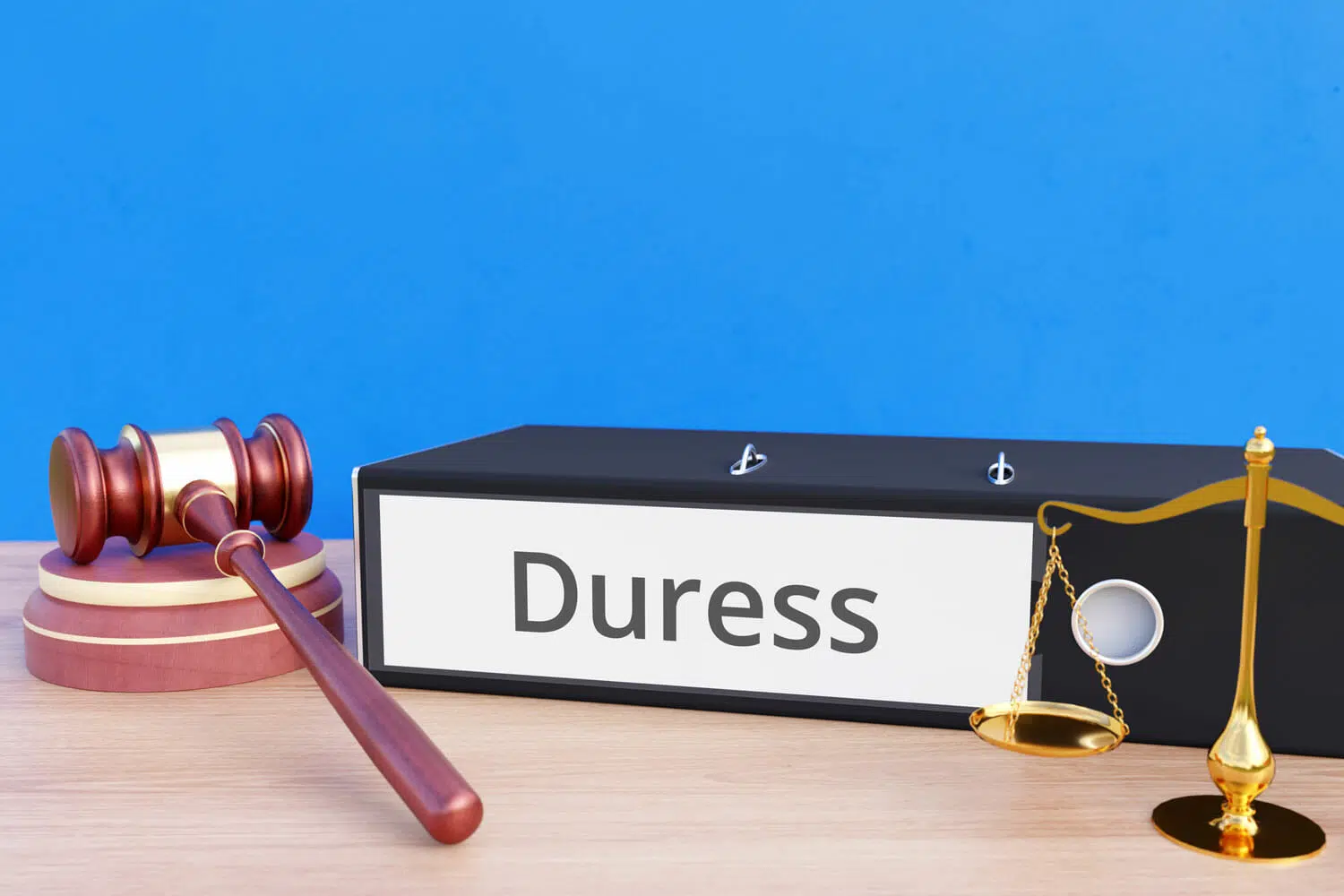If you signed a separation agreement under duress, you don’t want to miss this. If you’re unsure what “duress” means, just ask Jared and Lindsay Rowley, who entered into an oral contract with Jesse Dimmick not to turn him over to the police. According to the American Bar Association, Dimmick and the Rowleys sealed their oral agreement upon the event of Dimmick kidnapping and holding the Rowleys hostage1. He sued them for breach of contract. They claimed that they agreed to his contractual terms under duress. You know, as kidnap victims held by a kidnapper.
Duress in Virginia Law
The cliche “I signed under duress” is bandied about in enough movies and television that most people think they know what it means. Most people would be wrong. Duress is tough to prove.
We can turn to esteemed Justice Claude Hilton, writing in AV v iParadigms for United States District Court (Virginia), for a proper legal definition:
“In Virginia, duress is defined as the overbearing of a person’s free will by an unlawful or wrongful act or by threat such that the party’s consent to a contractual agreement is involuntary.”
One person’s wrongful act is another person’s attempt to earnestly convince you. One man’s threat is another man’s sincere promise. Proving that your free will was infringed upon or taken away by your wife could be a tough sell, even for an eager Virginia family law attorney.
Oh, duress is most definitely illegal and frowned upon. Just look at where it pops up in Code of Virginia:
- § 20-89.1. Suit to annul marriage: “When a marriage is alleged to be void or voidable [blah blah blah] by virtue of fraud or duress, either party may institute a suit for annulling the same …
- § 20-88.02:1. Limitations on spousal support orders: “[Blah blah blah] … due to exceptional circumstances resulting in significant financial duress …”
- § 20-49.1. How parent and child relationship established: “[Blah blah blah] … the statement resulted from fraud, duress or a material mistake of fact …
Those references are just for Domestic Relations. A few dozen other laws include the concept of duress, in wills, contracts, trade, and on and on.
What Constitutes Duress?
Pinning down exactly what constitutes duress is the tricky part. Too often (as in case law such as 2016’s Gust v. Gust, Va. Ct. of Appeals, Unpublished, No. 0901-15-2), the spouse with second thoughts attempts to claim duress after signing a perfectly valid legal document, such as a prenuptial agreeement, property settlement agreement, or separation agreement.
The courts have seen this repeatedly, especially with prenuptial agreements (we cite 2012’s Wang v. Crumpacker, Va. Ct. of Appeals, Unpublished, No. 1904-11-4, which is completely legit but also has two great names, Wang and Crumpacker, and even lawyers have a sense of humor and, yes, sometimes we act like we’re 12). Anyway, courts have repeatedly rejected these arguments.
Duress is not in the eye of the beholder. It is a legal bar to reach, and not an easy one. Second thoughts, realizing you missed out on a chance to get more out of your ex, or even her nagging are not considered duress.
Duress is a threat of bodily or financial harm, or an actual act of physical violence. Duress is, to use Dimmick’s model, your spouse kidnapping you and saying she will let you go when you sign the separation agreement.
Proving Duress in Virginia
Virginia courts are busy places. Bring them something neat, tidy, and self-evident and you will have plenty of support.
Show evidence. Show text threats: “Sign the separation agreement or I will make sure you never see a penny from this marriage.” Show cell phone video of her holding a lit match and the kerosene can (that’s the blue container) over your black velvet Elvis painting. Show security camera footage of her pouring gasoline (that’s the red container) over the parchment vinyl top of your 1969 Camaro RS Z28.
Look to The Firm For Men for Solutions
If you have only your word against hers, you probably will make little headway with a Circuit Court judge. The solution to being turned away in court is to forge a strong, fair separation agreement in the first place.
Enlist an experienced Virginia family law attorney to help you. Get a properly worded agreement and avoid nagging feelings of regret. When done right, you and she will both agree to sign and the word “duress” will never cross your mind.
And Dimmick? He was later convicted for murder. So, yeah, he is a kidnapper/murderer, and the courts threw out his lawsuit against the Rowleys.
If you suspect you entered into your separation agreement under duress, come to The Firm For Men. Contact us online, or telephone our offices. We will be happy to review your case and, if possible, seek redress for any problems the agreement brought. We zealously defend men’s rights in Virginia family law. Unless … you know … you’re Jesse Dimmick.
1. http://www.abajournal.com/news/article/convicted_kidnapper_sues_his_victims_for_breach_of_contract

